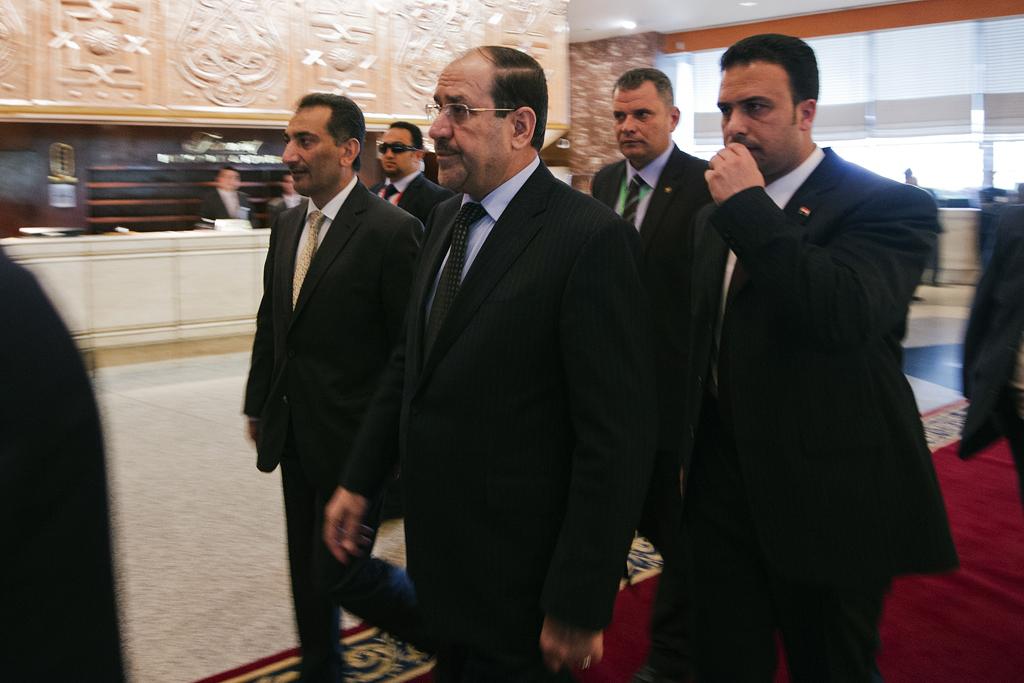Iraq PM Nouri al-Maliki warns Syrian rebel victory could destabilize region in AP interview
Iraq Prime Minister Nouri al-Maliki (C) arrives to attend the 12th summit of the Organisation of Islamic Cooperation on February 6, 2013 in Cairo. The 12th summit of the Organisation of Islamic Cooperation opened in Cairo, with Syria’s civil war and the battle against Islamist militants in Mali topping the agenda.
Iraqi Prime Minister Nouri al-Maliki warned that if the Syrian rebels win the civil war it could create a haven for extremists and destabilize the region, in an interview with the Associated Press.
The AP noted that while al-Maliki stopped short of voicing support for Syrian President Bashar al-Assad's regime, his comments were the strongest warnings to date of the turmoil a collapse in the government could cause.
Al-Maliki, a Shiite Muslim, voiced a fear common among other Shiites that Sunni Muslims would take over in Syria once Assad was ousted.
"Neither the opposition nor the regime can finish each other off," he told the AP. "The most dangerous thing in this process is that if the opposition is victorious, there will be a civil war in Lebanon, divisions in Jordan and a sectarian war in Iraq."
Al-Maliki's comments come as the United States has hinted at expanding support for the Syrian rebels. US Secretary of State John Kerry said the United States is seeking ways "to accelerate the transition" from Assad's regime.
Anti-government protests in Iraq that began in earnest in 2011, inspired by the Arab Spring, soon lost momentum. But in recent months they have flared again among the country's Sunni minority.
Protesters accuse Al-Maliki of bias toward the Shiite majority, at the expense of the Sunnis and other minority groups.
Austin Long, assistant professor of International and Public Affairs at Columbia University, spent many years in Iraq as a military analyst and adviser.
Long told GlobalPost that there were legitimate concerns that a post-Assad Syria could destabilize the region. He said if the rebels win, it would likely resemble the current situation in Libya, where a variety of armed militias dominate certain areas with no real central government control.
“Libya had knock-on effects to Mali that no one anticipated,” he said during a Skype interview on Monday. “Syria touches on so many more places that are already unstable, like Iraq, Lebanon and even Jordan.”
Long said there is also the possibility that a Sunni extremist state with ties to Al Qaeda could develop in Syria, which would have devastating effects for the region.
The US government believes that one of the Syrian opposition's strongest forces, the Islamic group Jabhat al-Nusra, is an extension of Al Qaeda in Iraq (AQI). The United States officially designated al-Nusra a terrorist organization in December.
“We have strong reason to believe Jabhat al-Nusra contains a lot of people affiliated with AQI,” Long said. “This means they already have a lot of Iraqi blood on their hands."
The rebel group's possible affiliation with Al Qaeda also complicates US efforts to support the Syrian opposition. So far the United States has refrained from outright arming the rebels, fearing the weapons could fall into the hands of terrorist groups.
But Long warned of the danger of lumping all Islamic rebel groups in Syria under the same terrorist banner.
“Jihadist or extremist does not automatically make you a terrorist,” he said. The targeting of civilians is the real mark of a terrorist, he said. “You need to look at the tactics.”
More on GlobalPost: Kerry signals greater US support for Syrian resistance
Every day, reporters and producers at The World are hard at work bringing you human-centered news from across the globe. But we can’t do it without you. We need your support to ensure we can continue this work for another year.
Make a gift today, and you’ll help us unlock a matching gift of $67,000!
